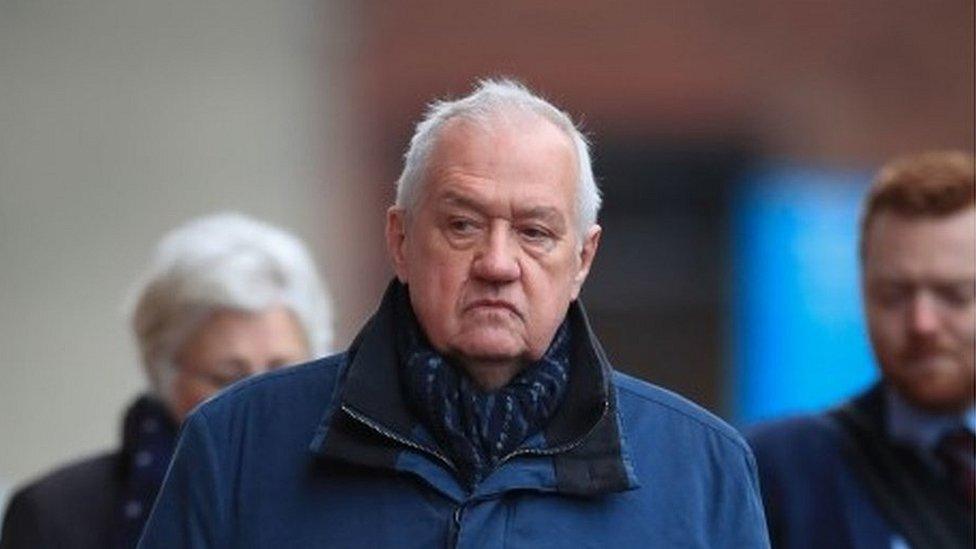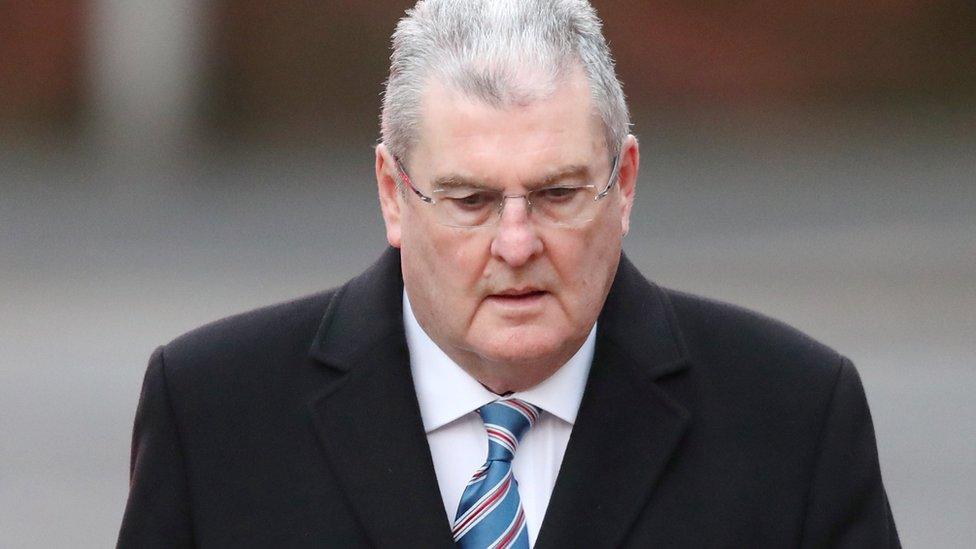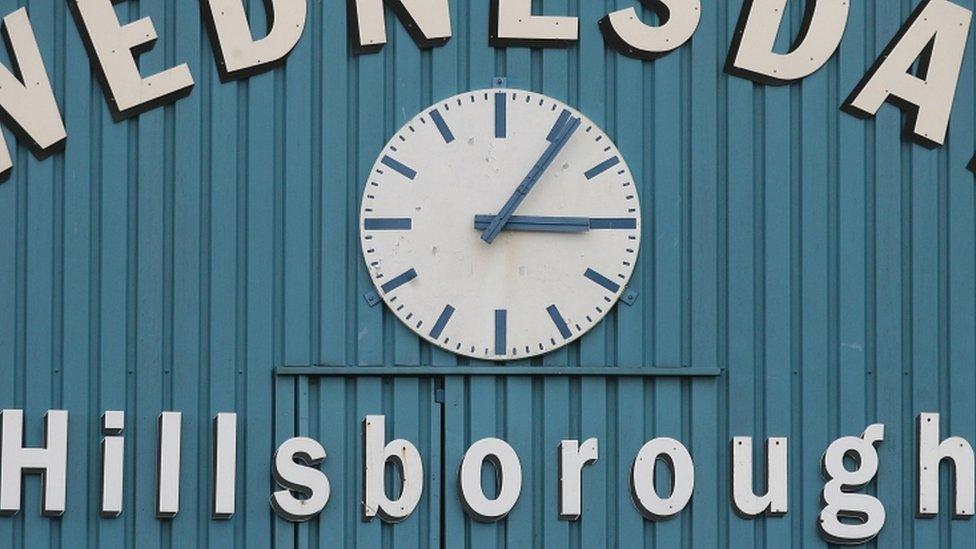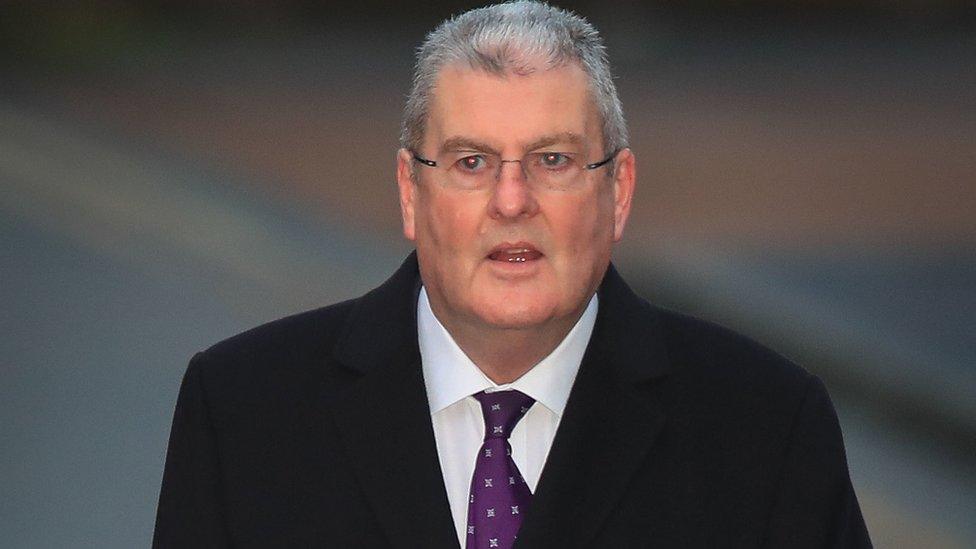Hillsborough trial: David Duckenfield 'will not testify'
- Published

Match commander David Duckenfield denies the gross negligence manslaughter of 95 fans
Hillsborough match commander David Duckenfield will not testify in his trial for the gross negligence manslaughter of 95 football fans.
Starting the defence case, Benjamin Myers QC, told the jury at Preston Crown Court: "We don't call Mr Duckenfield to give evidence."
The 74-year-old is on trial alongside Graham Mackrell, 69, the former club secretary at Sheffield Wednesday, who is accused of a safety offence.
Both men deny the charges.
The trial follows a crush in the central pens of the Leppings Lane terrace during the 1989 Liverpool v Nottingham Forest FA Cup semi-final.
'Open the gates'
Benjamin Myers QC called statements from Bernard Murray, who was the retired chief superintendent's deputy on the day and has since died.
In a statement made on 2 May 1989, Mr Murray said the plan for policing the match was the same one adopted in 1988 when the same teams met at the same venue.
At that game the match commander was Chief Superintendent Brian Mole, but he had been moved just weeks before the 1989 game and replaced by Mr Duckenfield.
A reduction by 10% in the numbers of officers on duty at the game was agreed during a series of pre-match meetings attended by senior ranks.
At a meeting with Mr Mole, a request to switch ends of the ground, so Liverpool fans were given the Kop end, was rejected.
On the day of the disaster, Mr Duckenfield gave all those on duty a briefing before they went to the control room ahead of the game.
By 14:30, Mr Murray's statement said there was a "large crowd" outside the Leppings Lane turnstile but he "remarked" to his boss that they still had time to "get them in".
They agreed kick-off would only be delayed if there was an "identifiable problem" such as congestion on the motorway approach to the city or bad weather.
Mr Murray's statement said officers became "exasperated" at the poor communications as the radios were not working properly, and at 14:45 the first request came in to "open the gates" to relieve crush pressure at the turnstiles.
As more requests came in to open the gates, Mr Murray's statement continued: "I turned around to Chief Supt Duckenfield and said, 'Mr Duckenfield, are you going to open the gates?'
"He replied, 'Open the gates."'

Graham Mackrell denies failing to discharge a duty under the Health and Safety at Work Act
The jury was then told of Mr Murray's evidence to the 1989 Taylor Inquiry into the disaster.
At that time he was asked where he thought all the fans being let in were going to go.
He replied: "I never considered where they were all going to go."
Mr Murray told the inquiry he never checked the readily available turnstile numbers, to see how many fans still had to enter the Leppings Lane terrace, and he did not appreciate they would go down the tunnel leading directly to the central pens.
The defence case for Hillsborough match commander David Duckenfield concluded, one hour and 14 minutes after it began.
'Entirely dependable'
Co-defendant Graham Mackrell was also not called to give evidence as the court heard his defence case.
Jurors were earlier told they would be directed to return a not guilty verdict for Mr Mackrell on a charge of contravening the stadium's safety certificate due to "insufficient evidence".
The 69-year-old remains on trial charged with failing to discharge a duty under the Health and Safety at Work Act.
The jury heard eight character references for Mr Mackrell, including statements from Roy Hattersley, the Sheffield-born former Labour MP and former manager of Sheffield Wednesday, Howard Wilkinson, who worked with Mr Mackrell between 1983 and 1988.
His statement read: "In relation to administrative matters, Graham's work was always of a high standard.
"He worked hard, was self-motivated and brought a professional quality to his role.
"I found him to be entirely dependable, highly regarded by the board of directors.
"In all respects I found Graham to be competent, proficient and trustworthy."
Under the law at the time, there can be no prosecution for the 96th victim, Tony Bland, as he died more than a year and a day after the disaster.
The trial continues.
- Published5 March 2019

- Published23 January 2019
